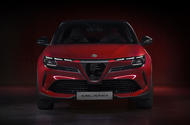The Milano’s name change to Junior was also to avoid being drawn into a political row
Boss speaks out after brand changes name of new crossover due to criticism from Italian industry minister
Alfa Romeo boss Jean-Philippe Imparato has urged European politicians to focus on protecting jobs in the car industry, rather than the names of cars, following a spat that prompted the rebranding of the brand’s new crossover.
The car was rebranded from Milano to Junior just five days after it was revealed, after claims by Italian industry minister Adolfo Urso that it violated an Italian law that geographical names can be used only on products that are produced in Italy.
The crossover will be produced at a Stellantis plant in Tychy, Poland. The law is generally applied to products such as Parmigiano Reggiano cheese.
Urso’s claims followed comments by Stellantis boss Carlos Tavares at the unveiling of the Milano warning the Italian government against offering incentives to Chinese and other foreign firms to establish battery and car production facilities in the country.
Speaking to Autocar, Imparato said the decision to change the name of the Milano was made despite legal advice that the name didn’t violate the law and to avoid being drawn into a political row.
“When they told me it was forbidden by law – it’s not – I said: ‘Calm down: I’m not here to play politics; I’m just here to make an Alfa Romeo that’s sustainable for the future.’”
Noting that the name change “created a buzz I could never have dreamed of”, Imparato said the Milano name was revealed in December and it had been known for years that the car would be produced in Poland alongside the Jeep Avenger and Fiat 600e, with which it shares the Stellantis e-CMP platform.
“If I wanted to answer the question of Giuletta and Mito owners who have wanted a B-segment car since 2021, I didn’t have any other solution than to follow the platform,” he added. “I couldn’t invent a local solution.”
Imparato also noted that when Stellantis was formed in January 2021, Alfa was losing “hundreds of millions of euros” but is now profitable and that the next-generation Stelvio SUV and Giulia saloon, due in 2025 and 2026, would be built in Italy.
He noted that Italy would be the only country in Europe that would produce cars on both the Stellantis SLTA Medium and Large platforms, adding that “of the five cars in my strategy, four are made in Italy”.
Imparato suggested that European politicians should be more focused on the growing threat of Chinese car makers that are expanding their production into Europe – which he said represents the “core” risk to Stellantis and the European car industry in the future.
“When you see MG launching a car priced at €16,000 in Spain, I’m sure they are losing tonnes of cash, but they are full of cash,” he said.
“You see Tesla cutting €10,000 or more and dropping European margins from 18% to 7% or 8% and you see some of our German competitors in China working at -40% in terms of discount to save their asses. When you see that, you have to be firm on the total production cost of each car.
“There are two categories of guys: the ones who understand they have to move, and the ones who don’t understand they have to move. Each and every week, you’re hearing from some guys, very big ones, saying ‘we have to give up’, and this is just the beginning of the bloodbath. But some guys don’t see that. They open the door and say ‘hey, welcome’. Good luck, my friend, because don’t think they will come alone: they will come with their suppliers.”
Imparato estimated that 12 million people work in the European car industry, and with 1% of the market worth around 150,000 cars, he added: “Each time a competitor catches 1% of market share, you have a question mark on one factory; 10 points of market share, 10 factories.
“So I can change the name of Milano because we aren’t Italian with the car – but one point of market share, 150,000 cars, one factory. This is very concerning, because in this factory you have people, and I don’t even speak about the suppliers. The impact could be huge.”







